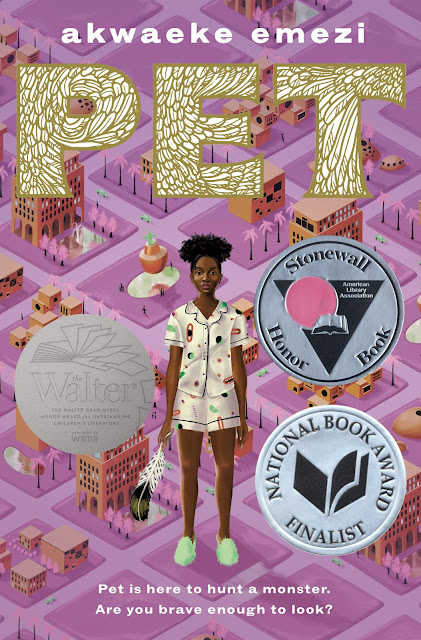Pet by Awaeke Ezemi, 208 pp, RL: Middle School
PET
Cover Art by Shyama Golden
Purcahsed from First Book
Lucille is a city founded on the revolution cry lifted from an old Gwendolyn Brooks poem, "We are each other's harvest; we are each other's business; we are each other's magnitude and bond." Emezi frames this revolution simply, with good winning over evil, angels triumphing over monsters. Yet, readers will quickly identify the monsters in the novel as monsters of our own world. The angels of Lucille "took apart the prisons and the police." They banned firearms, eliminated physical violence and "took the laws and changed them, tore down those terrible statues of of rich men who'd owned people and fought to keep owning people. The angels believed and the people agreed that there was a good amount of proper and deserved shame in history and some things were just never going to be things to be proud of." Lucille is a utopian community where the racism and white supremacy that divides and ravages our nation has been torn down. Lucille is a community filled with love, gentleness and support where, empathy and compassion have replaced hatred and fear. Yet, with Lucille, Emezi shows readers that, while utopias can be created, it is work to maintain them and community members must never become complacent.
Into this community, many years after the monsters, Jam, a trans girl, was born. Selectively mute and communicating almost entirely with sign language, fifteen-year-old Jam is protected and loved by her parents, Aloe and Bitter, her local librarian, Ube (who learned to sign so he could communicate with her) and her best friend, Redemption. Magic in the world Emezi created is pulsating and alive, a force of its own - not one that is controlled with wands and spells. Jam has an extrasensory connection with her family home that goes beyond interpreting the creaks and moans of the wood. Jam's mother, a painter, creates a work that vibrates with energy and, under the right circumstances, life. When Jam, entranced by the work, falls on it and cuts her hand, her blood brings the goat-legged, golden feathered, horned creature of the painting (one that reminds Jam of the ancient images of angels - real, fierce, angels, not the human angels who started the revolution) to life, asking her to help pull it free from the canvas.
Pet, the name it gives itself, tells Jam that it is in Lucille to hunt monsters. Having never known a monster, Jam is sure that Pet is mistaken, but somehow can't bring herself to send Pet back to the world it came from, even though she knows this in in her power. While Pet and the idea of hunting a monster fills her with fear, Jam remains calm and reflective. Somehow, having never seen a monster, living in a community where everyone believes monsters have been erased, Jam is perfectly poised to see around corners and open her eyes to what is right in front of her - what no one else wants to see, no one else wants to believe and therefore they don't see it or believe it exists, much the way many white Americans don't want to believe that racism and white privilege exist in our country.
When Pet tells Jam that the monster is in Redemption's house, she is shocked and doesn't want to believe it, but can't live with the possibility that someone in his family is being hurt. Together, the friends work to overcome their own unwillingness to believe, to see what is right in front of them, and to confront the monster/abuser in Redemption's family.
Emezi, who uses the pronoun "they," has previously written works for adults, including the highly acclaimed Freshwater, which is being turned into a television show. They were asked by Christopher Myers, creative director of the Make Me A World imprint, to write a YA novel and, inspired by his philosophy that books are "spells you put into the world," they thought about what kind of spell they wanted. Emezi wanted to cast a spell where, "a black trans girl is never hurt. Her parents are completely supportive. Her community is completely supportive. She's not in danger. She gets to have adventures with her best friend. And I hope that's a useful spell for young people. I hope that's a spell where someone reads that and they're like, this is what my life should be like. This is a possibility." Emezi also wanted to write a book about a teenager black girl who is not sexualized, and in Jam they have created a "tender, shy, nonsexual black girl." Emezi has layered so many serious, meaningful, important ideas to ponder, along with nods to black women writers like Brooks and NK Jemisin, and Lucille Clifton, that there is a lot to unpack in one review and I hope that I have scratched the surface well here. As author Ibi Zoboi so eloquently said in her review of PET for the New York Times, this book is a "nesting doll of creative possibilities, very much like children themselves, the angels among us."



